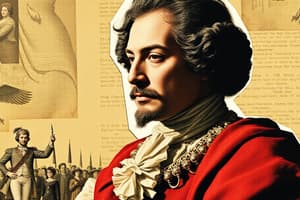Podcast
Questions and Answers
Who inherited an empty treasury due to long-term wars?
Who inherited an empty treasury due to long-term wars?
- Louis XVI (correct)
- Napoleon Bonaparte
- Louis XIV
- King Henry IV
Which estate paid all taxes in France?
Which estate paid all taxes in France?
- Second estate (nobility)
- First estate (clergy)
- Third estate (commoners) (correct)
- All estates paid taxes equally
Where did the third estate declare themselves the National Assembly?
Where did the third estate declare themselves the National Assembly?
- Notre-Dame Cathedral
- Eiffel Tower
- Palace of Versailles (correct)
- Louvre Museum
What event marked the beginning of the French Revolution?
What event marked the beginning of the French Revolution?
Which philosopher proposed a society based on freedom and equal laws?
Which philosopher proposed a society based on freedom and equal laws?
Which document inspired French political thinkers during the revolution?
Which document inspired French political thinkers during the revolution?
What significant event occurred on September 21, 1792, in France?
What significant event occurred on September 21, 1792, in France?
Which group was part of the third estate in pre-revolutionary France?
Which group was part of the third estate in pre-revolutionary France?
During the Reign of Terror, which individual enforced strict control and harsh punishments?
During the Reign of Terror, which individual enforced strict control and harsh punishments?
Which document emphasized the right to life, freedom of speech, and equality before the law during the French Revolution?
Which document emphasized the right to life, freedom of speech, and equality before the law during the French Revolution?
Which leader reintroduced slavery in France ten years after its abolition during the revolution?
Which leader reintroduced slavery in France ten years after its abolition during the revolution?
What did the French Revolution influence in Europe?
What did the French Revolution influence in Europe?
Flashcards are hidden until you start studying
Study Notes
- Louis XVI, a 20-year-old French king from the Bourbon family, ascended the throne in 1774, inheriting an empty treasury due to long-term wars.
- France's currency, the livre, was discontinued in 1794.
- Society was divided into three estates: the clergy (first estate), nobility (second estate), and commoners (third estate).
- The third estate paid all taxes and was divided into three categories.
- The first category, composed of businessmen and court officials, was relatively affluent.
- The second category, peasants and artisans, had little money.
- The third category, landless peasants, laborers, and servants, was the poorest.
- The first and second estates enjoyed privileges, while the third estate paid all taxes.
- The church collected taxes from the peasants in the form of tithes and other indirect taxes.
- The growing population led to food scarcity and rising bread prices.
- The middle class, formed by educated professionals, envisioned a society without privileges based on birth.
- Philosophers like Rousseau and Montesquieu proposed a society based on freedom and equal laws.
- The American Constitution served as an inspiration for French political thinkers.
- The Revolution began on May 5, 1789, when Louis XVI proposed an increase in taxes.
- The third estate demanded one vote per member, which was rejected.
- They assembled in the tennis court at Versailles and declared themselves the National Assembly.
- They drafted a constitution on August 4, 1789, abolishing feudal obligations and taxes, making France a constitutional monarchy.
- The final constitution was completed in 1791, creating a constitutional monarchy with legislative, executive, and judiciary powers.
- The National Assembly was indirectly elected by citizens.
- The declaration of the Rights of Man and Citizen emphasized the right to life, freedom of speech, freedom of opinion, and equality before the law.
- Post-revolution, Louis XVI sought help from neighboring states to stop the revolutionary events in France.- France, in the 18th century, was ruled by a monarchy with three estates: the clergy, the nobility, and the commoners (third estate).
- The third estate, which consisted of merchants, professionals, and peasants, faced a subsistence crisis.
- The draft of the new constitution reduced the powers of the monarchy and divided it among the legislature, executive, and judiciary, making France a constitutional monarchy.
- On September 21, 1792, France abolished the monarchy and declared itself a republic.
- King Louis XVI and Queen Marie Antoinette were executed publicly in quick succession.
- The period from 1793 to 1794 is known as the Reign of Terror, during which Robespierre's government enforced strict control and harsh punishments on perceived enemies.
- The revolution brought about significant changes for women: they established clubs for political discussions, demanded the right to vote, and gained access to education and employment opportunities.
- Abolition of slavery was a complex issue during the revolution: the Convention abolished it in 1794, but Napoleon Bonaparte reintroduced it ten years later, and it wasn't permanently abolished until 1848.
- The revolutionary period brought about the end of the feudal system in many parts of Europe and influenced the formation of sovereign nation states.
- The revolution led to the ideals of liberty and democratic rights becoming widespread in Europe.
- Napoleon Bonaparte, who saw himself as a modernizer, conquered neighboring countries and reformed Europe, but was ultimately defeated at Waterloo in 1815.
Studying That Suits You
Use AI to generate personalized quizzes and flashcards to suit your learning preferences.




